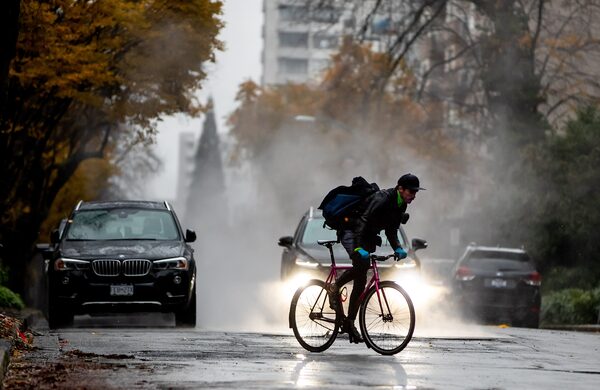
Steam rises from freshly laid asphalt as a person rides a bike in the rain, in Vancouver, Nov. 26, 2020.DARRYL DYCK/The Canadian Press
Vancouver is moving ahead with a plan to require parking permits by the end of the year for every resident storing a car on public streets, likely to cost a minimum of $30 to $45 annually.
However, the rate will likely be higher for “more polluting new vehicles,” according to information posted by staff on the city’s website this week announcing a timeline for consultation and a final plan.
The parking-permit concept was one of several recommendations in the climate-emergency response plan that council approved late last year and is meant to dissuade car use.
Vancouver transportation director Paul Storer said initial consultation will start Wednesday, with a survey of the public to identify what might be the potential problems and benefits.
“The first phase is really gathering information – what isn’t working well. We want to make sure it’s solving as many problems as we can.”
News of the launch has prompted a flurry of praise and criticism from the public, along with support and concern from different councillors.
“Some I talk to feel this is an unnecessary cash grab,” said Non-Partisan Association Councillor Melissa De Genova. She voted against the idea, which is part of the city’s broader-ranging climate-emergency response plan. “Also, let’s think about all the ramifications … there are concerns about people like home-care workers, tradespeople, technicians.”
But OneCity Councillor Christine Boyle said this move could help free up parking for seniors and people with disabilities when others have more of an incentive to use their garages.
“It’s really about good use of this shared public space.”
The public is also divided.
Joey Broda, a 27-year-old renter, said he generally supports the idea of citywide permits.
“I think efforts to diminish the strange hold the car has on transportation is a good thing,” he said. “Personal vehicle infrastructure also eats up so much space and makes it less convenient to get around on foot. I think this is the future that people my age want.”
The one downside Mr. Broda sees is that his landlord uses the existing garage on the property, so he and his roommates, who share a vehicle, will be the ones who end up paying the cost of the permit.
The changes will affect who can park in about 260,000 of the city’s existing 300,000 street parking spaces. About 30,000 of those spaces already require resident parking permits. About 11,600 spaces are metered.
The permitting system is one of the first actions to be taken as part of the city’s climate-emergency response plan. That plan also included suggestions to create a toll area for Vancouver’s Broadway and downtown business districts and to introduce penalties or incentives to get residents and business owners to upgrade their buildings to make them more energy efficient.
Vancouver currently requires residents to buy parking permits for their cars in 24 zones, including an area around Boundary Road and Joyce Street in the east, Strathcona near Chinatown, Kits Point, Fairview Slopes, Oakridge and the West End.
Permits in most areas are $45.45, but go to around $67 near hospitals and are $400 in the West End. There are generally only two permits allowed per household.
Mr. Storer said one of the key issues for staff to figure out will be how to allow for visitors, including tradespeople, caregivers, nurses and others.
“The one thing people struggle with now, we know, is when visitors come. So the question is how to make it easy to have visitors come into the zone. We’re confident we will be able to resolve that.”
Special to The Globe and Mail
We have a weekly Western Canada newsletter written by our B.C. and Alberta bureau chiefs, providing a comprehensive package of the news you need to know about the region and its place in the issues facing Canada. Sign up today.
 Frances Bula
Frances Bula